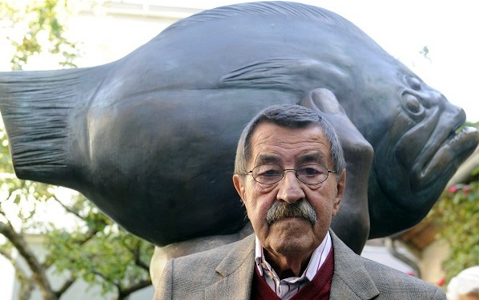GUNTER GRASS (1927, 2015)
German Author, Artist, Activist and Nobel Laureate

As you can see above, Grass shared Horst's strange fascination with fish. Grass's novel Flounder (Der Butt) is based on the fariy tale, The Fisherman and His Wife, where a golden flounder grants wishes. Grass's fish plays the role of provocateur and agent between the characters, which is also Grass's role as author. Grass is the the fish who navigates the unconscious fears and desires of men and women.
Thus Grass's flounder operates like Jung's Fish, exploring in the depths of the subconscious. Whether Grass was consicous of this or not doesn't matter. It surfaced out of the collective unconscious.
Over the years Grass made many illustrations and several sculptures of fish, like the one above.
His novel, The Tin Drum, 1959 was one of Horst's favorite novels. Grass turns arrested development inside out with Oskar, the narrator and protagonist, consicously halting his physical development at the age of three. Somehow, Oskar continues through life having affairs and children. Oskars' stunted physical status is symbolic of a stunted psychological state, and symbolic of how the Nazis stunted Germany's youth. The book is often describes as Magic Realism, but such an impossible situation could also be Surrealistic.
Horst and Grass were born a few months apart, and therefore shared similar experiences, especially during the war. They were both in the Luftwaffenhelfer, (Flak Crew). At the end of the war, they were both sent to American internment camps, and later excelled in their studies. Coincidentally, they attended Kunstakademie Düsseldorf at the same time in 1954.
Leveraging his celebrity as an author and Nobel laureate, Grass became an outspoken Socialist, and critic of Germany’s denial of its Nazi past. Unfortunately, Grass failed to disclose that he had been drafted into the Waffen-SS and served in a Panzer division. When he finally revealed this to the public in 2006, he was subjected to intense criticism for hypocrisy.
The terror, betrayal and loss of childhood left both Horst and Grass damaged young men. Sadly, Grass did not resolve his internal conflicts until he was 79. In contrast, by moving to America, and emersing himself in his art, Horst was able to move beyond them much sooner. In Germany, it was impossible for Grass to reveal the truth, so repressed symbolism emerged spontaneously in his art: Grass the Flounder, with both eyes on one side of his head, could only see half the world.